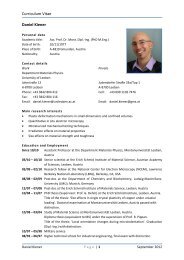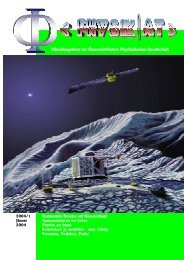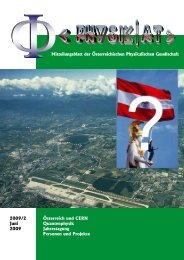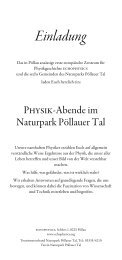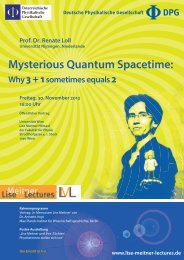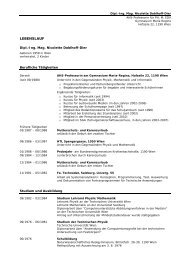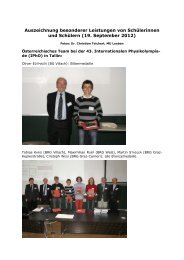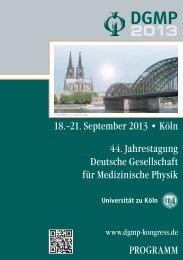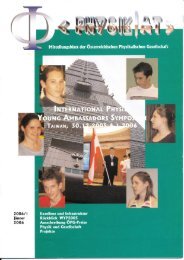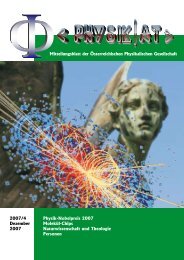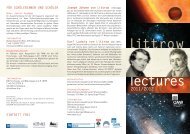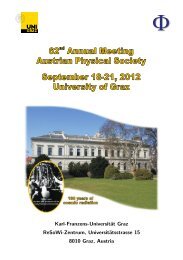Untitled - Austrian Physical Society
Untitled - Austrian Physical Society
Untitled - Austrian Physical Society
Erfolgreiche ePaper selbst erstellen
Machen Sie aus Ihren PDF Publikationen ein blätterbares Flipbook mit unserer einzigartigen Google optimierten e-Paper Software.
We believe that important and challenging problems facing the world today are the threats of climate change and the<br />
anticipated global peaking of fossil energy production with the upcoming shortage of oil and gas.<br />
These coincide with increasing global demand for energy originating from the presently less developed world. lntensive<br />
research and development of satisfactory clean alternative energy sources are urgently needed. The main candidates are<br />
biomass, hydro, nuclear, solar and wind power. Physics is an important provider of knowledge and methods of analysis<br />
concerning energy and environment, challenges that are with us today and will be with us on a time scale of generations.<br />
Mankind cannot afford to neglect to explore any possible energy sources.<br />
PHvslcs, Cor'{psrrrrvENEss AND TscxNor.ocv<br />
Recent studies have shown that over 40% of manufacturing employment in the UK is in industries based on physics (and<br />
physics-related engineering) and that this sector is growing faster than other manufacturing sectors. Similar effects can be<br />
expected for many other countries.<br />
Areas of physics which are playing an important role in competitiveness include the energy sectors, medicine, materials and<br />
emerging areas such as information and communications technologies, photonics and nanotechnology. Physics gives the<br />
means for understanding a wide range of technologies and the ability to tackle problems from first principles when conventional<br />
approaches fail. Physics underpins engineering and its role in wealth creation. Physics also plays a major role in the<br />
present-day life sciences through the provision of techniques and equipment and as an important participant in these<br />
interdisciplinary fields. Notable techniques from physics used in medicine include MRl, PET scans, etc.<br />
New technology requires basic research as it is not possible to predict where the new techniques will come from. History is<br />
full of examples of technology that has come from basic research in physics, e. 9., electric power, X-rays, etc. Examples of<br />
recent developments that have come from surprising areas of physics include the World Wide Web and THz imaging<br />
developed to see through the atmospheres of planets and now used for security scanning to detect weapons, etc. under<br />
clothes. Knowledge of the fundamental laws of physics is the starting point for the majority of present-day and emerging technologies.<br />
lndustrial development is increasingly characterized by outsourcing, sparked off by a feeling of a lack of predictability and that the source<br />
of new ideas appears to be drying up. The challenge is international, as is physics, which serves as an innovative tool no matter where<br />
production is carried out. lndustry is becoming increasingly global, relying on basic research performed around the world. Physics<br />
works on a global scale, dependent on the interaction of groups of physicists in different countries and regions. ln Asia industry is<br />
expanding rapidly supported by greatly increased investment in the basic sciences, in physics in particular.<br />
Unbiased and reliable research, essential for the long-term contribution of physics to economic competitiveness, requires<br />
international cooperation and an open exchange of information. Any serious conflict of interest with the later commercialization<br />
of results originating in such research should not arise as long as publicly funded research infrastructures themselves<br />
are not commercial competitors.<br />
Nreos N REsEARcH PoucrEs AND FUNDING<br />
- The governments should accelerate the implementation of the Lisbon 2000 agenda and realize its objectives<br />
- The research infrastructure including large-scale facilities should be distributed across Europe in a balanced way and<br />
combined with strong ,,home bases" as an interface for the cooperation. ln eligible countries structural funds should be<br />
better used for this purpose<br />
- lntegration of the scientific potential of the new EU member states and the associated states should be accelerated<br />
- The bottom-up principle of science funding should be kept for basic research and strengthened via the creation of the<br />
European Research Council<br />
- The assessment of research output and impact should be put onto a more rational basis with the development of<br />
qualitative as well as quantitative indicators and analysis tools<br />
- Researchers should be able to maintain their independence from political and commercial interests with proper<br />
consideration of societal needs and respecting ethical issues<br />
- Serious attention should be paid to the quality of science administrators and to the reduction of bureaucracy by streamlining<br />
and developing best management practices<br />
- A larger fraction of the EU budget as well as national funding should be spent on mathematical and physical sciences in<br />
accordance with tendencies in other major regions in the world<br />
- The harmonization of the whole European R&D is important, but the presently proposed concepts of a European lnstitute<br />
of Technology are not the appropriate solution. On the other hand instruments exist to reach these goals (e.9. technology<br />
platforms and ERC)<br />
- Physics pioneered international cooperation which should be strengthened to countries outside the EU including the<br />
developing countries



